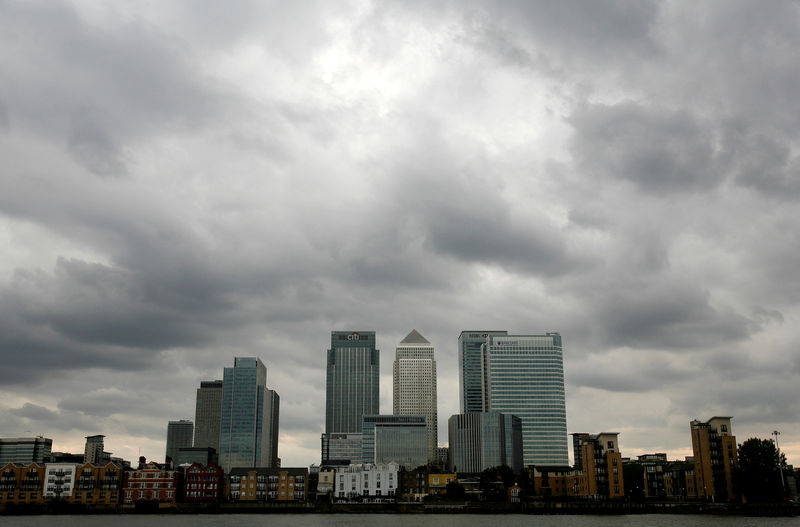By Jamie McGeever
LONDON (Reuters) - Money managers charged with investing trillions of dollars of global savings haven't abandoned Britain just yet, but the uncertainty created by Brexit has made them extremely wary about investing in UK Plc.
Portfolio managers, strategists and investment officers at 13 asset or wealth management firms controlling more than $7 trillion of assets have told Reuters that their broadly negative view on Britain hasn't changed since the June 23 referendum that paved the way for its exit from the European Union.
Many of these money managers currently hold UK stocks and bonds and have no fixed plan to cut and run yet. Some say they will consider adding to their holdings once the Brexit fog of uncertainty lifts.
But right now, most say the situation is very fluid, they are nervous about developments and are ready to review holdings at any stage.
"We are losing visibility on the UK," said Eric Brard, head of fixed income and debt asset management at Amundi, a global asset manager with more than $1.1 trillion worth of assets under management.
For a country that relies on overseas investors to balance its books by funding its current account deficit - "the kindness of strangers", in the words of Bank of England governor Mark Carney - even the hint that capital inflows might dry up could have serious consequences.
With one of the biggest balance of payments deficits in the developed world of around 6 percent of annual economic output, Britain needs that capital to keep coming in. If it's not forthcoming, sterling's value - the shop window price for all UK assets to the rest of the world - must drop far enough to make it attractive enough to return.
"For a period of time the UK was an attractive place to put capital. But that has certainly changed for us and a number of other people that I speak to," said Ryan Myerberg, portfolio manager at Janus Capital, a U.S. firm with $195 billion of assets under management.
THE PENNY DROPS
The post-Brexit volatility across UK markets has been best captured by the wild swings in the pound, which have been more akin to an emerging market currency than the fourth biggest and most traded currency on the planet.
Sterling has fallen 18 percent since the referendum and five percent in the last five days. It's at a 31-year low against the dollar, its lowest on a trade-weighted basis since the 1970s, and the BoE is investigating last Friday's "flash crash" which saw it plunge 10 percent in a matter of hours before recovering.
"Sterling should eventually go lower. How much lower though?" said Brian Tomlinson, senior fixed income portfolio manager at Allianz (DE:ALVG) Global Investors, a firm with $520 billion of assets under overall management.
As long as the Bank continues with super-easy monetary policy the currency will remain on the defensive, though UK stocks and bonds will retain some allure. But any indication that a spiraling sterling collapse would force the Bank to shift to a tighter stance could quickly change that.
For now, the politics surrounding the details of Brexit and its effect on the economy and financial industry is driving sentiment.
Prime Minister Theresa May effectively fired the Brexit starting gun on Oct. 2 by saying negotiations would start next March. Worryingly for investors, it appears a 'hard Brexit' may be on the cards, where control of immigration takes priority over Britain's tariff-free access to the European single market.
TOXIC MIX
If investors doubted the UK government's ability to negotiate a successful Brexit strategy, they are aware that elections in France and Germany next year will only stiffen the resolve of the rest of the EU in these negotiations.
"For some investors in the UK the way politicians are heading the discussion is a concern, because of the uncertainty around the negotiations," said David Zahn, head of European Fixed Income, Franklin Templeton Fixed Income Group.
The growing sense that Brexit's political process will be chaotic has sent UK markets into a spin. UK government bonds have started to tumble, pushing yields sharply higher, albeit from historically low levels.
The benchmark 10-year gilt yield this week rose above 1 percent for the first time since June and is up 30 basis points so far this month, on course for the biggest monthly spike since February last year.
This is a potentially toxic mix: a tumbling currency, rising bond yields, accelerating inflation and a sluggish economy.
"I don't see where the additional portfolio flows are going to come into a currency that has long held a reserve currency status but now looks vulnerable," said Mark Dowding, co-head of investment grade, BlueBay Asset Management, a firm with $58 billion of assets under management.
But some investors point out that the dance between a weaker pound and stronger stock market may continue a while longer yet.
"We have been relatively positive on the equity market because of the multi-national exposure around the currency and the rebound in oil markets," said Thushka Maharaj at JP Morgan Asset Management's Global Multi-Asset Solutions team.
"It has some more room to go but it's not clear how much. It depends where the currency stabilizes," she said.
JP Morgan Asset Management has a total of $1.6 trillion of assets under management.
Sterling is the third largest currency in central banks' foreign exchange reserves holdings, the equivalent of more than $350 billion, although it is still a long way behind the U.S. dollar and euro.
More than half of UK stocks are held by overseas investors, up sharply from less than 10 percent as late as the 1980s and around 35 percent at the turn of the century.

Overseas investors hold just over a quarter of outstanding British government bonds, or around 500 billion pounds' worth.